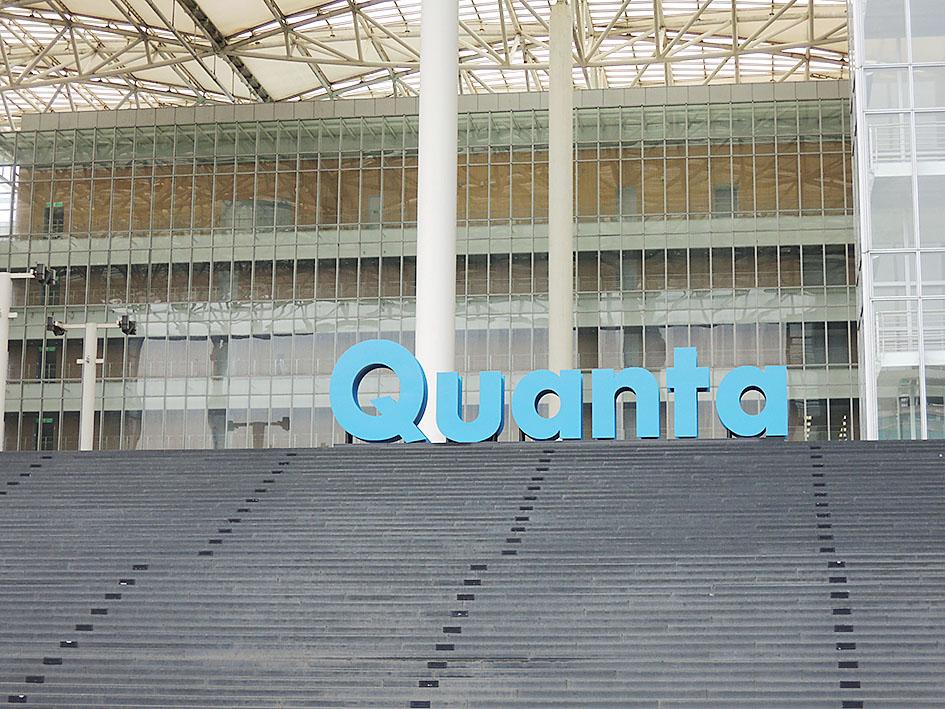Quanta Computer Inc (廣達電腦), one of the world’s leading contract notebook computer makers, yesterday reported strong profit for the first quarter, but added that a severe shortage of key components could affect its business.
“Our growth could be limited by a shortage of components,” Quanta spokesman Elton Yang (楊俊烈) told an online investors’ conference.
“The situation is severe, and it is hard to calculate how short we are,” Yang added.

Photo: Vanessa Cho, Taipei Times
Revenue growth this quarter would be limited to single-digit percentage sequential growth due to the shortage, but the company would fight to keep up with surging demand, he said.
With good order visibility extending into the third quarter, the outlook for the second half of the year is better than for the first half, he said.
“There would be no problem with demand for laptops in 2021,” Yang said.
Laptop demand remains robust even as the COVID-19 pandemic eases with nations introducing vaccination programs, but shortages of key components, including display panels and graphics cards, have had a knock-on effect, causing a laptop shortage.
Last year, Quanta shipped a record 59.8 million laptops, up 70 percent from a year earlier.
Shipments in the first quarter of this year totaled 19 million units, down 700,000 units from a year earlier, company data showed.
Quanta posted a net profit of NT$7.1 billion (US$253.6 million) in the first quarter, down 17.72 percent quarter-on-quarter, but up 175.18 percent year-on-year.
Earnings per share were NT$1.84, a new record for the first quarter.
Revenue in the first quarter was NT$268.95 billion, down 11.25 percent quarter-on-quarter, but up 41.33 percent year-on-year.
Gross margin was 6.33 percent, up 0.13 percentage points from a quarter earlier and 1.48 percentage points from the same period last year, the company said.

Shares in Taiwan closed at a new high yesterday, the first trading day of the new year, as contract chipmaker Taiwan Semiconductor Manufacturing Co (TSMC, 台積電) continued to break records amid an artificial intelligence (AI) boom, dealers said. The TAIEX closed up 386.21 points, or 1.33 percent, at 29,349.81, with turnover totaling NT$648.844 billion (US$20.65 billion). “Judging from a stronger Taiwan dollar against the US dollar, I think foreign institutional investors returned from the holidays and brought funds into the local market,” Concord Securities Co (康和證券) analyst Kerry Huang (黃志祺) said. “Foreign investors just rebuilt their positions with TSMC as their top target,

REVENUE PERFORMANCE: Cloud and network products, and electronic components saw strong increases, while smart consumer electronics and computing products fell Hon Hai Precision Industry Co (鴻海精密) yesterday posted 26.51 percent quarterly growth in revenue for last quarter to NT$2.6 trillion (US$82.44 billion), the strongest on record for the period and above expectations, but the company forecast a slight revenue dip this quarter due to seasonal factors. On an annual basis, revenue last quarter grew 22.07 percent, the company said. Analysts on average estimated about NT$2.4 trillion increase. Hon Hai, which assembles servers for Nvidia Corp and iPhones for Apple Inc, is expanding its capacity in the US, adding artificial intelligence (AI) server production in Wisconsin and Texas, where it operates established campuses. This

H200 CHIPS: A source said that Nvidia has asked the Taiwanese company to begin production of additional chips and work is expected to start in the second quarter Nvidia Corp is scrambling to meet demand for its H200 artificial intelligence (AI) chips from Chinese technology companies and has approached contract manufacturer Taiwan Semiconductor Manufacturing Co (TSMC, 台積電) to ramp up production, sources said. Chinese technology companies have placed orders for more than 2 million H200 chips for this year, while Nvidia holds just 700,000 units in stock, two of the people said. The exact additional volume Nvidia intends to order from TSMC remains unclear, they said. A third source said that Nvidia has asked TSMC to begin production of the additional chips and work is expected to start in the second

US President Donald Trump on Friday blocked US photonics firm HieFo Corp’s US$3 million acquisition of assets in New Jersey-based aerospace and defense specialist Emcore Corp, citing national security and China-related concerns. In an order released by the White House, Trump said HieFo was “controlled by a citizen of the People’s Republic of China” and that its 2024 acquisition of Emcore’s businesses led the US president to believe that it might “take action that threatens to impair the national security of the United States.” The order did not name the person or detail Trump’s concerns. “The Transaction is hereby prohibited,”